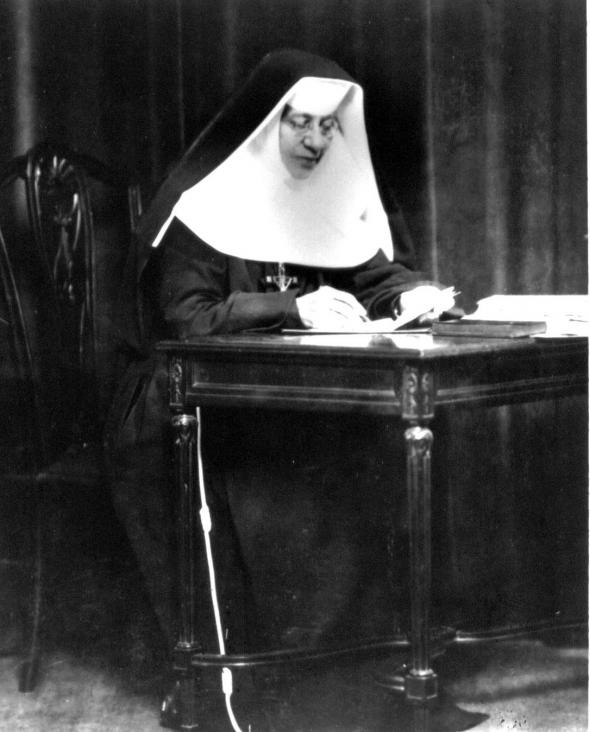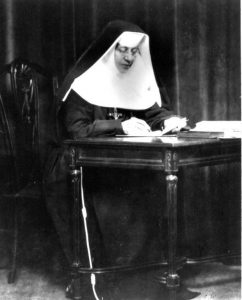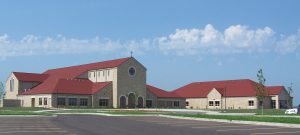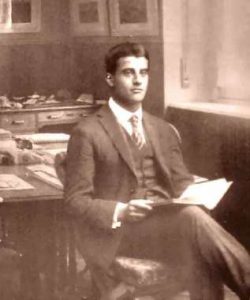
St. Katharine Drexel, photographed ca. 1910-1920. Photo credit: Wikimedia Commons
By Renae Kranz
It is easier for a camel to pass through the eye of a needle, than for a rich man to enter into the kingdom of heaven. (Matthew 19:24)
Every time I hear the gospel reading with this verse tucked neatly into it, I squirm a bit in my pew.
Don’t misunderstand me. I’m not rich by most people’s standards. My husband and I live in a modest home, drive normal (not new) cars, take normal vacations. We live like a typical middle class American family would.
But we all know a typical middle class American family would be considered wealthy compared to most of the rest of the world. So I start to wonder when I hear that verse, “Is it hopeless for me to get to heaven? Am I that rich man trying to squeeze through the needle’s eye?”
Well, nothing is ever hopeless with God. With Him, all things are possible. And thankfully, we have many saints who have shown us how to keep our “wealth” in perspective and still pass through that needle’s eye.

One of our best examples was an American herself. St. Katharine Drexel was the second American to be canonized a saint. A wealthy heiress, she set the bar for how to handle earthly wealth and still attain the riches of heaven.
Katharine Drexel was born in Philadelphia on November 26, 1858, to Francis Anthony Drexel, an investment banker, and his wife Hannah Langstroth. Hannah died only weeks after Katharine’s birth. For two years, she and her sister, Elizabeth, lived with an aunt and uncle. When her father remarried in 1860, Katharine and Elizabeth returned home. A third daughter, Louisa, joined the family a few years later.
The three Drexel daughters enjoyed a privileged life because of their father’s wealth. They were educated by private tutors and traveled with their parents throughout the United States and Europe. Sounds like a “silver spoon” childhood, right? Hang tight. There was much more to this family.
The Drexel family were devout Catholics and practiced what the Church taught about the spiritual and corporal works of mercy. Several times a week the family opened the doors of their own home to those in need. They gave food and clothing to the poor and assisted families with rent. If someone was too proud to come to them, the Drexel’s went out to quietly find them and help them.
Katharine watched and helped her parents do all these things. She saw her father pray 30 minutes each evening. They gave her an enduring example of how to be a wealthy person but also be a good Catholic—by not becoming attached to material belongings.
This can be a hard thing for many of us to grasp and maybe harder to actually accomplish. But somehow, we have to learn to not really care about stuff. That doesn’t mean we neglect our things and ourselves. It does mean we put them in their proper place.
One thing that has helped me was a suggestion from a priest in the Diocese of Sioux Falls. When Father Shaun Haggerty was in his first years of priesthood at the parish I attend, he made a suggestion in a homily that has stuck with me.
He said when the priest is blessing the gifts and placing them on the altar, we should also make an offering. He suggested saying something like this: “Lord I offer everything I have to you, for without you I have nothing.”
The trick here is to really mean it, understanding that at any moment, everything (or everyone) we have could be gone. If we know we are God’s, none of those things matter. It reminds us He gave them to us for a specific reason—to offer them up and give them away to further His kingdom.
Katharine shows us being grateful isn’t enough. We must share what we have.
I have to imagine Katharine shared in our struggles to let go of any focus she might have had on possessions. She was a wealthy young woman in the upper crust of society when she made her social debut in 1878. She likely attended parties and enjoyed many things associated with wealth at that time. She may have found it difficult to imagine giving up that life for a very different one dedicated to the service of God.
However, life has a way of teaching us hard lessons sometimes. Katharine’s stepmother suffered for three years with terminal cancer. Watching her suffer made Katharine realize money can’t buy you an escape from pain or from death. This was a major turning point in her life. God would soon set her on a new path.
A few years later, Katharine traveled with her family to the Western states, and she saw firsthand the plight of the Native Americans. She was appalled by their treatment and condition. She knew she would have the means to help them, but she would need the Lord’s help to do it.
Katharine’s father died in 1885 when she was in her mid-twenties. In order to protect his daughters from ruthless men only seeking to get to their money through marriage, he set up his will so their inheritance would go to children or grandchildren upon their deaths. If there were no children, the money would be split up and distributed to several named charities. In the end, the sisters shared an estate that in today’s money would be worth about $400 million.
Can you imagine the temptation that must have caused? But the new path I mentioned earlier was opening up, and Katharine felt its pull in her life.
One of the first things the Drexel sisters did with their inheritance was contribute money to the St. Francis Mission on the Rosebud Reservation in South Dakota. Soon after that she and her sisters traveled to Europe and were granted a private audience with Pope Leo XIII. They asked him for missionaries to help at some of the missions for Native Americans they were supporting. Instead, he suggested Katharine become the missionary.
Since she had received marriage proposals and was active in society, Katharine consulted her spiritual director, Bishop James O’Connor, about the direction she should take. It didn’t take long for her to decide to give herself and her inheritance completely over to God. She entered the Sisters of Mercy Convent in Pittsburgh in May of 1889.

She later established her own religious congregation, the Sisters of the Blessed Sacrament, in Pennsylvania. They dedicated their lives to helping Native and African Americans in the Western and Southwestern U.S. That work included opening boarding schools, staffing missions, and financing projects. In all, she established 145 missions, 50 schools for African Americans and 12 schools for Native Americans.
Katharine died March 3, 1955, at 96. Since neither she nor her sisters had any children at their deaths, their fortune which had been supporting her work now went to the charities designated by her father. The Sisters of the Blessed Sacrament continue to pursue Katharine’s mission without the help of those funds.
Most of us will never have the kind of wealth Katharine had, but that doesn’t mean we can’t give from what we do have. We have to find ways to detach ourselves from our possessions.
I’m not saying you have to give away everything or never buy anything ever again (unless you really feel the call to do that). Pray for the grace to see your possessions (great or small) for what they are—tools to help accomplish the work the Lord has asked you to do in this life. If you can do that, you will feel free to love and give to others from your bounty or from your need.
St. Katharine Drexel was canonized October 1, 2000. As the patron saint of philanthropy, pray for her intercession in seeing wealth as a gift to be used to further the kingdom of God.
Get the latest "Can We Be Saints?" post in your inbox!
[jetpack_subscription_form title=”” subscribe_text=”Signup to be notified of the Saint’s Blog updates” subscribe_button=”Sign Up for Saints”]


